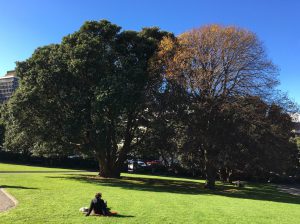WelCom June 2017: My walk to work in Wellington tracks through Parliament grounds. Occasionally tourist groups gather on the driveway, fixatedly snapping pictures of the capital’s historic stone buildings with their backs to the magnificent trees that adorn the grounds.
Beautiful trees play a valuable role in making the world the kind of place where we want to live. Consider big trees and the significance of Arbour Day on 5 June. There are no special days for stabilising rocks or cleaning water so what’s so special about a day dedicated to tree planting?
Established in New Zealand since 1890 in Greytown, Arbour Day has strong Catholic roots. In 1805 in a Spanish village in the Sierra de Gata, a local priest, don Ramon Vacas Roxo, held the first modern Arbour Day with the support of the villagers. He believed in the importance of trees for health, hygiene, decoration, ecosystems, customs, food and domestic use and decided that planting trees should be celebrated. The village had a three-day holiday with dancing and feasting. After Mass, a poplar tree, festooned in church decorations, was planted in a valley near the village. Don Ramon sent a manifesto to surrounding towns in defence of trees, aiming to spread the respect of nature and encourage the planting of trees. This initiative picked up the 1594 tradition established in another Spanish village, when lime and horse-chestnut trees were planted in celebration of the life-giving nature of trees.
The old giants of our native species – kauri, kahikatea, totara, rimu, rata and pohutukawa – are living objects of awe. The biggest living things on this land are landmarks that stand out as a history of a people. Tree rings mark the impact of humans on the environment. Their bark often records the dreams of explorers, lovers and poets.
Given the huge challenges we face about the degradation of our planet and the disappearance of multiple species, should we take tree planting more seriously to signify new beginnings with regard to the interconnectedness of all living things?
Our Catholic tradition obliges us to hold everything in our created world in trust for future generations. Reflecting on Laudato Si’ in the May issue of Tui Motu InterIslands, theologian Helen Bergin concludes, ‘We are invited to think generously towards the future and to exercise prudence today. This ethic is grounded in the virtue of love.’
I believe a focus for living in faith is knowing our little seeds, our small steps, are important. One prudent step towards a life-giving future would be to plant a tree this Arbour day on 5 June, which is also World Environment Day.
Catherine Gibbs
